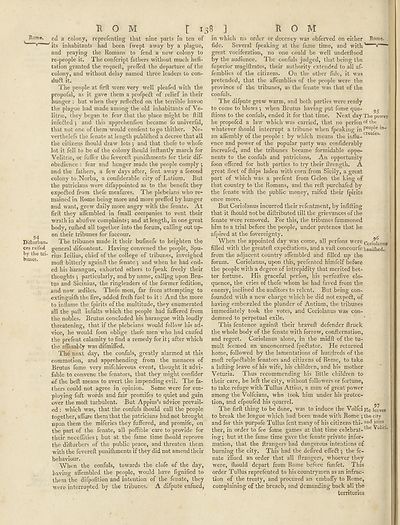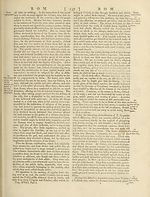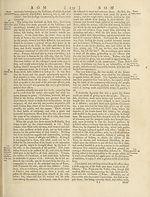Encyclopaedia Britannica, or, a Dictionary of arts, sciences, and miscellaneous literature : enlarged and improved. Illustrated with nearly six hundred engravings > Volume 18, RHI-SCR
(146) Page 138
Download files
Complete book:
Individual page:
Thumbnail gallery: Grid view | List view

ROM
Rome.
94
Difturban-
ces raifed
cd a colony, reprefenting that nine parts in ten of
its inhabitants had been fwept away by a plague,
and praying the Romans to fend a new colony to
re-people it. The confcript fathers without much hefi-
tation granted the requefl., preffed the departure of the
colony, and without delay named three leaders to con-
du£t it.
The people at firft were very well pleafed with the
propofal, as it gave them a profpeft of relief in their
hunger : but when they reflefted on the terrible havoc
the plague had made among the old inhabitants of Ve-
litrte, they began to fear that the place might be ftill
infefted ; and this apprehenfion became fo univerfal,
that not one of them would confent to go thither. Ne-
verthelefs the fenate at length publifhed a decree that all
the citizens Ihould draw lots 5 and that thofe to whofe
lot it fell to be of the colony fhould inflantly march for
Velitrae, or fuffer the fevered punifhments for their dif-
obedience : fear and hunger made the people comply ;
and the fathers, a few days after, fent away a fecond
colony to Norba, a confiderable city of Latiura. But
the patricians were difappointed as to the benefit they
expected from thefe meafures. The plebeians who re¬
mained in Rome being more and more prefled by hunger
and want, grew daily more angry with the fenate. At
firft they aflembled in fmall companies to vent their
wrath in abufive complaints j and at length, in one great
body, ruftied all together into the forum, calling out up¬
on their tribunes for fuccour.
The tribunes made it their bufinefs to heighten the
general difcontent. Having convened the people, Spu-
by the tri- rjus JcJlJUSj chief of the college of tribunes, inveighed
moft bitterly againft the fenate j and when he had end¬
ed his harangue, exhorted others to fpeak freely their
thoughts particularly, and by name, calling upon Bru¬
tus and Sicinius, the ringleaders of the former fedition,
and now aediles. Thefe men, far from attempting to
extinguifh the fire, added freftt fuel to it: And the more
to inflame the fpirits of the multitude, they enumerated
all the paft infults which the people had buffered from
the nobles. Brutus concluded his harangue with loudly
threatening, that if the plebeians would follow his ad¬
vice, he would foon oblige thofe men who had caufed
the prefent calamity to find a remedy for it j after which
the affembly was difmiffed.
The next day, the confuls, greatly alarmed at this
commotion, and apprehending from the menaces of
Brutus fome very mifchievous event, thought it advi-
fable to convene the fenators, that they might confider
of the beft means to avert the impending evil. The fa¬
thers could not agree in opinion. Some were for em¬
ploying foft -words and fair promifes to quiet and gain
over the moft turbulent. But Appius’s advice prevail¬
ed : which was, that the confuls ftiould call the people
together, allure them that the patricians had not brought
upon them the miferies they buffered, and promife, on
the part of the fenate, all poftible care to provide for
their neceflities} but at the fame time fliould reprove
the difturbers of the public peace, and threaten them
with the fevereft punilhments if they did not amend their
behaviour.
When the confuls, towards the clofe of the day,
having affembled the people, would have fignified to
them the difpofition and intention of the fenate, they
were interrupted by the tribunes. A difpute enfued,
[8 ] R O M
in which no order or decency was obferved on either Rome. J
fide. Several fpeaking at the fame time, and with''T**
great vociferation, no one could be well underftood
by the audience. The confuls judged, that being the
fuperior magiftrates, their authority extended to all af-
femblies of the citizens. On the other fide, it was
pretended, that the affemblies of the people were the
province of the tribunes, as the fenate Avas that of the
confuls.
The difpute grew warm, and both parties Avere ready
to come to bloAvs •, Avhen Brutus having put fome que- ^
ftions to the confuls, ended it for that time. Next day The power
he propofed a laAV Avhich was carried, that no perfonot the
Avhatever fliould interrupt a tribune Avhen fpeaking in ln-’
an affembly of the people : by which means the influ-
ence and poAver of the popular party was confiderably
increafed, and the tribunes became formidable oppo¬
nents to the confuls and patricians. An opportunity
foon offered for both parties to try their ftrength. A
great fleet of fliips laden Avith corn from Sicily, a great
part of which Avas a prefent from Gelon the king of
that country to the Romans, and the reft purchafed by
the fenate with the public money, raifed their fpirits
once more.
But Coriolanus incurred their refentment, by infifting
that it ftiould not be diftributed till the grievances of the
fenate Avere removed. For this, the tribunes fummoned
him to a trial before the people, under pretence that he
afpired at the fovereignty.
When the appointed day Avas come, all pcrfons were Coriolanur
filled with the greateft expectations, and a vaft concourfe baniflied.
from the adjacent country affembled and filled up the
forum. Coriolanus, upon this, prefented himfelf before
the people Avith a degree of intrepidity that merited bet¬
ter fortune. His graceful perfon, his perfuafive elo¬
quence, the cries of thofe Avhom he had laved from the
enemy, inclined the auditors to relent. But being con¬
founded Avith a new charge Avhich he did notexpeCf, of
having embezzled the plunder of Antium, the tribunes
immediately took the votes, and Coriolanus Avas con¬
demned to perpetual exile.
This fentence againft their braAreft defender ftruck
the Avhole body of the fenate Avith forrorv, confternation,
and regret. Coriolanus alone, in the midft of the tu¬
mult feemed an unconcerned fpeCtator. He returned
home, folloAved by the lamentations of hundreds of the
moft refpeClable fenators and citizens of Rome, to take
a lading leave of his Avife, his children, and his mother
Veturia. Thus recommending his little children to
their care, he left the city, Avithout folloAvers or fortune,
to take refuge with Tullus Attius, a man of great poAver
among the Volfcians, Avho took him under his protec¬
tion, and efpoufed his quarrel.
The firft thing to be done, Avas to induce the Volfci He leaves
to break the league Avhich had been made Avith Rome ; the city
and for this purpofe Tullus fent many of his citizens thi- anll .i°'n?.
ther, in order to fee fome games at that time celebrat-1^10 ^1CU
ing*, but at the fame time ga\re the fenate private infor¬
mation, that the ftrangers had dangerous intentions of
burning the city. This had the defired effieCd ) the fe¬
nate iffued an order that all ftrangers, Avhoever they
Avere, fhould depart from Rome before 1’unfet. This
order Tullus reprefented to his countrymen as an infrac¬
tion of the treaty, and procured an embaffy to Rome,
complaining of the breach, and demanding back all the
territories
Rome.
94
Difturban-
ces raifed
cd a colony, reprefenting that nine parts in ten of
its inhabitants had been fwept away by a plague,
and praying the Romans to fend a new colony to
re-people it. The confcript fathers without much hefi-
tation granted the requefl., preffed the departure of the
colony, and without delay named three leaders to con-
du£t it.
The people at firft were very well pleafed with the
propofal, as it gave them a profpeft of relief in their
hunger : but when they reflefted on the terrible havoc
the plague had made among the old inhabitants of Ve-
litrte, they began to fear that the place might be ftill
infefted ; and this apprehenfion became fo univerfal,
that not one of them would confent to go thither. Ne-
verthelefs the fenate at length publifhed a decree that all
the citizens Ihould draw lots 5 and that thofe to whofe
lot it fell to be of the colony fhould inflantly march for
Velitrae, or fuffer the fevered punifhments for their dif-
obedience : fear and hunger made the people comply ;
and the fathers, a few days after, fent away a fecond
colony to Norba, a confiderable city of Latiura. But
the patricians were difappointed as to the benefit they
expected from thefe meafures. The plebeians who re¬
mained in Rome being more and more prefled by hunger
and want, grew daily more angry with the fenate. At
firft they aflembled in fmall companies to vent their
wrath in abufive complaints j and at length, in one great
body, ruftied all together into the forum, calling out up¬
on their tribunes for fuccour.
The tribunes made it their bufinefs to heighten the
general difcontent. Having convened the people, Spu-
by the tri- rjus JcJlJUSj chief of the college of tribunes, inveighed
moft bitterly againft the fenate j and when he had end¬
ed his harangue, exhorted others to fpeak freely their
thoughts particularly, and by name, calling upon Bru¬
tus and Sicinius, the ringleaders of the former fedition,
and now aediles. Thefe men, far from attempting to
extinguifh the fire, added freftt fuel to it: And the more
to inflame the fpirits of the multitude, they enumerated
all the paft infults which the people had buffered from
the nobles. Brutus concluded his harangue with loudly
threatening, that if the plebeians would follow his ad¬
vice, he would foon oblige thofe men who had caufed
the prefent calamity to find a remedy for it j after which
the affembly was difmiffed.
The next day, the confuls, greatly alarmed at this
commotion, and apprehending from the menaces of
Brutus fome very mifchievous event, thought it advi-
fable to convene the fenators, that they might confider
of the beft means to avert the impending evil. The fa¬
thers could not agree in opinion. Some were for em¬
ploying foft -words and fair promifes to quiet and gain
over the moft turbulent. But Appius’s advice prevail¬
ed : which was, that the confuls ftiould call the people
together, allure them that the patricians had not brought
upon them the miferies they buffered, and promife, on
the part of the fenate, all poftible care to provide for
their neceflities} but at the fame time fliould reprove
the difturbers of the public peace, and threaten them
with the fevereft punilhments if they did not amend their
behaviour.
When the confuls, towards the clofe of the day,
having affembled the people, would have fignified to
them the difpofition and intention of the fenate, they
were interrupted by the tribunes. A difpute enfued,
[8 ] R O M
in which no order or decency was obferved on either Rome. J
fide. Several fpeaking at the fame time, and with''T**
great vociferation, no one could be well underftood
by the audience. The confuls judged, that being the
fuperior magiftrates, their authority extended to all af-
femblies of the citizens. On the other fide, it was
pretended, that the affemblies of the people were the
province of the tribunes, as the fenate Avas that of the
confuls.
The difpute grew warm, and both parties Avere ready
to come to bloAvs •, Avhen Brutus having put fome que- ^
ftions to the confuls, ended it for that time. Next day The power
he propofed a laAV Avhich was carried, that no perfonot the
Avhatever fliould interrupt a tribune Avhen fpeaking in ln-’
an affembly of the people : by which means the influ-
ence and poAver of the popular party was confiderably
increafed, and the tribunes became formidable oppo¬
nents to the confuls and patricians. An opportunity
foon offered for both parties to try their ftrength. A
great fleet of fliips laden Avith corn from Sicily, a great
part of which Avas a prefent from Gelon the king of
that country to the Romans, and the reft purchafed by
the fenate with the public money, raifed their fpirits
once more.
But Coriolanus incurred their refentment, by infifting
that it ftiould not be diftributed till the grievances of the
fenate Avere removed. For this, the tribunes fummoned
him to a trial before the people, under pretence that he
afpired at the fovereignty.
When the appointed day Avas come, all pcrfons were Coriolanur
filled with the greateft expectations, and a vaft concourfe baniflied.
from the adjacent country affembled and filled up the
forum. Coriolanus, upon this, prefented himfelf before
the people Avith a degree of intrepidity that merited bet¬
ter fortune. His graceful perfon, his perfuafive elo¬
quence, the cries of thofe Avhom he had laved from the
enemy, inclined the auditors to relent. But being con¬
founded Avith a new charge Avhich he did notexpeCf, of
having embezzled the plunder of Antium, the tribunes
immediately took the votes, and Coriolanus Avas con¬
demned to perpetual exile.
This fentence againft their braAreft defender ftruck
the Avhole body of the fenate Avith forrorv, confternation,
and regret. Coriolanus alone, in the midft of the tu¬
mult feemed an unconcerned fpeCtator. He returned
home, folloAved by the lamentations of hundreds of the
moft refpeClable fenators and citizens of Rome, to take
a lading leave of his Avife, his children, and his mother
Veturia. Thus recommending his little children to
their care, he left the city, Avithout folloAvers or fortune,
to take refuge with Tullus Attius, a man of great poAver
among the Volfcians, Avho took him under his protec¬
tion, and efpoufed his quarrel.
The firft thing to be done, Avas to induce the Volfci He leaves
to break the league Avhich had been made Avith Rome ; the city
and for this purpofe Tullus fent many of his citizens thi- anll .i°'n?.
ther, in order to fee fome games at that time celebrat-1^10 ^1CU
ing*, but at the fame time ga\re the fenate private infor¬
mation, that the ftrangers had dangerous intentions of
burning the city. This had the defired effieCd ) the fe¬
nate iffued an order that all ftrangers, Avhoever they
Avere, fhould depart from Rome before 1’unfet. This
order Tullus reprefented to his countrymen as an infrac¬
tion of the treaty, and procured an embaffy to Rome,
complaining of the breach, and demanding back all the
territories
Set display mode to:
![]() Universal Viewer |
Universal Viewer | ![]() Mirador |
Large image | Transcription
Mirador |
Large image | Transcription
Images and transcriptions on this page, including medium image downloads, may be used under the Creative Commons Attribution 4.0 International Licence unless otherwise stated. ![]()
| Permanent URL | https://digital.nls.uk/193020605 |
|---|
| Attribution and copyright: |
|
|---|
| Description | Ten editions of 'Encyclopaedia Britannica', issued from 1768-1903, in 231 volumes. Originally issued in 100 weekly parts (3 volumes) between 1768 and 1771 by publishers: Colin Macfarquhar and Andrew Bell (Edinburgh); editor: William Smellie: engraver: Andrew Bell. Expanded editions in the 19th century featured more volumes and contributions from leading experts in their fields. Managed and published in Edinburgh up to the 9th edition (25 volumes, from 1875-1889); the 10th edition (1902-1903) re-issued the 9th edition, with 11 supplementary volumes. |
|---|---|
| Additional NLS resources: |
|

